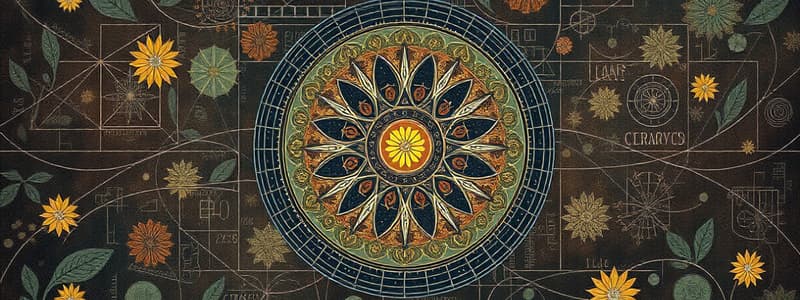Podcast
Questions and Answers
Which of the following is a central focus of mathematics?
Which of the following is a central focus of mathematics?
- The study of quantity (correct)
- Historical events
- Philosophical debate
- Literary analysis
What do mathematicians use to formulate new ideas?
What do mathematicians use to formulate new ideas?
- Patterns (correct)
- Personal opinions
- Random guesses
- Established laws
How do mathematicians verify the truth of their conjectures?
How do mathematicians verify the truth of their conjectures?
- Through popular vote
- By mathematical proofs (correct)
- Based on assumptions
- Using computer simulations
Which field applies mathematical and statistical methods to assess risk?
Which field applies mathematical and statistical methods to assess risk?
The study of data collection, analysis, and interpretation falls under which branch of mathematics?
The study of data collection, analysis, and interpretation falls under which branch of mathematics?
Around what time does evidence of counting date back to?
Around what time does evidence of counting date back to?
Who introduced systematic methods for solving linear and quadratic equations?
Who introduced systematic methods for solving linear and quadratic equations?
Which of the following fields contributed to the development of calculus?
Which of the following fields contributed to the development of calculus?
Which operation is part of arithmetic?
Which operation is part of arithmetic?
What does number theory primarily study?
What does number theory primarily study?
Which mathematical area deals with the properties of shapes and space?
Which mathematical area deals with the properties of shapes and space?
What is the focus of calculus?
What is the focus of calculus?
Which of the following provides a formal system for mathematical reasoning?
Which of the following provides a formal system for mathematical reasoning?
What does mathematical notation provide?
What does mathematical notation provide?
Which area of mathematics deals with discrete, rather than continuous, structures?
Which area of mathematics deals with discrete, rather than continuous, structures?
What is the purpose of mathematical modeling?
What is the purpose of mathematical modeling?
What is a mathematical proof?
What is a mathematical proof?
What area applies mathematical methods to solve problems in science, engineering, and other fields?
What area applies mathematical methods to solve problems in science, engineering, and other fields?
Flashcards
What is Mathematics?
What is Mathematics?
The study of quantity, structure, space, and change.
What are Conjectures?
What are Conjectures?
Statements that mathematicians try to prove true or false, based on patterns.
What is Statistics?
What is Statistics?
The mathematical study of data collection, analysis, interpretation, presentation, and organization.
What is Actuarial Science?
What is Actuarial Science?
Signup and view all the flashcards
What is Mathematical Finance?
What is Mathematical Finance?
Signup and view all the flashcards
What is Computer Science?
What is Computer Science?
Signup and view all the flashcards
What is Geometry and Arithmetic?
What is Geometry and Arithmetic?
Signup and view all the flashcards
What is Quantity?
What is Quantity?
Signup and view all the flashcards
Arithmetic
Arithmetic
Signup and view all the flashcards
Number Theory
Number Theory
Signup and view all the flashcards
Algebra
Algebra
Signup and view all the flashcards
Geometry
Geometry
Signup and view all the flashcards
Trigonometry
Trigonometry
Signup and view all the flashcards
Calculus
Calculus
Signup and view all the flashcards
Mathematical Notation
Mathematical Notation
Signup and view all the flashcards
Discrete Mathematics
Discrete Mathematics
Signup and view all the flashcards
Applied Mathematics
Applied Mathematics
Signup and view all the flashcards
Mathematical Modeling
Mathematical Modeling
Signup and view all the flashcards
Study Notes
- Mathematics studies quantity, structure, space, and change.
- There is no universally accepted definition of mathematics.
- Mathematicians identify and use patterns to form new mathematical conjectures.
- Mathematical proofs determine whether conjectures are true or false.
- Mathematical concepts are applicable to real-world phenomena.
- Mathematical structures often closely reflect reality.
- Mathematical problems are common in many sciences, especially physics.
- Statistics involves the mathematical study of data collection, analysis, interpretation, presentation, and organization.
- Actuarial science uses mathematical and statistical techniques to evaluate risk across finance, insurance, and other sectors.
- Mathematical finance uses mathematical tools in financial markets.
- Computer science uses mathematical logic, set theory, and graph theory.
- Mathematics is applied throughout engineering.
History
- Mathematics dates back thousands of years.
- Its origins lie in practical problems related to commerce, land measurement, and astronomy.
- Counting evidence has been found from at least 20,000 years ago.
- Ancient Babylonians created a number system and advanced algebra and geometry.
- Ancient Egyptians used geometry/arithmetic for surveying, construction, and pyramid building.
- Greek mathematics brought formal proof and significantly advanced geometry, number theory, and mathematical astronomy.
- Euclid’s "Elements" presented geometry within an axiomatic, logical structure.
- Archimedes developed methods to calculate areas/volumes and contributed to mechanics.
- Islamic scholars preserved and translated Greek mathematical texts and developed algebra.
- Al-Khwarizmi's algebra work introduced systematic methods for solving linear and quadratic equations.
- Indian mathematicians created the decimal number system and contributed to trigonometry.
- The Renaissance spurred mathematical advancements, including the development of calculus by Newton and Leibniz.
- Calculus offered new problem-solving tools in physics and engineering.
- Abstract algebra, non-Euclidean geometry, and mathematical logic were developed in the 19th century.
- The 20th century saw rapid mathematical growth, with new fields and applications emerging.
- Computers revolutionized mathematical research and enabled new areas of mathematics.
Branches of Mathematics
Quantity
- Quantity focuses on numbers and their operations.
- Arithmetic includes basic number operations: addition, subtraction, multiplication, and division.
- Number theory examines integer properties, including prime numbers, divisibility, and Diophantine equations.
Structure
- Structure is concerned with the properties and relationships of mathematical objects.
- Algebra examines abstract structures like groups, rings, and fields.
- Order theory studies partially ordered sets and relational structures.
Space
- Space studies shapes, sizes, and positions.
- Geometry studies the properties of shapes and space, including Euclidean geometry, non-Euclidean geometry, and topology.
- Trigonometry studies the relationship between angles and sides of triangles.
Change
- Change focuses on rates of change and motion.
- Calculus addresses continuous change through differentiation and integration.
- Differential equations model phenomena that change over time.
- Dynamical systems analyze the behavior of systems that evolve.
- Chaos theory describes systems with unpredictable behavior.
Foundations and Philosophy
- The philosophy of mathematics explores the nature and foundations of mathematics.
- Logic offers a formal system for mathematical reasoning.
- Set theory provides a basis for mathematics using sets and membership.
- Category theory gives a framework for studying mathematical structures/relationships.
Mathematical Notation
- Mathematical notation uses symbols to represent mathematical ideas.
- Includes symbols for numbers, operations, and variables.
- Notation allows concise and precise expression of mathematical concepts.
Discrete Mathematics
- Discrete mathematics studies discrete, rather than continuous, mathematical structures.
- Includes combinatorics, graph theory, and algorithms.
- Discrete mathematics is used in computer science, operations research, and cryptography.
Applied Mathematics
- Applied mathematics uses mathematical methods to address problems in science, engineering, and other fields.
- Numerical analysis develops algorithms to approximate solutions to mathematical problems.
- Optimization seeks the best solution to a problem based on constraints.
- Mathematical modeling uses equations to represent real-world systems.
Beauty of Mathematics
- Math is often described as beautiful due to its logical structure, elegance, and ability to reveal patterns/relationships.
- Some mathematicians appreciate the aesthetic qualities of mathematical proofs and theorems.
Mathematics Education
- Mathematics education involves teaching and learning at various levels.
- Pedagogy refers to math teaching methods and practices.
- Curriculum development involves designing and organizing math content for instruction.
- Assessment measures student understanding and skills in mathematics.
Mathematical Proof
- A mathematical proof is a logical argument verifying a statement's truth.
- Proofs rely on axioms, definitions, and proven theorems.
- Types of proofs include direct, indirect, and proofs by induction.
- Proof techniques: mathematical induction, proof by contradiction, and proof by contrapositive.
Mathematical Modeling
- Mathematical modeling involves creating mathematical representations of real-world phenomena.
- Models can analyze, predict, and control complex systems.
- Examples appear in physics, biology, economics, and engineering.
Influence of Mathematics
- Mathematics has a broad influence on life.
- It underlies technologies like computers, communication, and medical devices.
- Mathematics is used in finance, economics, and business.
- Mathematical reasoning is helpful in professions and daily life.
Mathematical Problems
- Mathematics is driven by the desire to solve problems.
- Some problems are motivated by practical applications, while others arise from within mathematics itself.
- Unsolved problems continue to drive mathematical research.
Studying That Suits You
Use AI to generate personalized quizzes and flashcards to suit your learning preferences.




